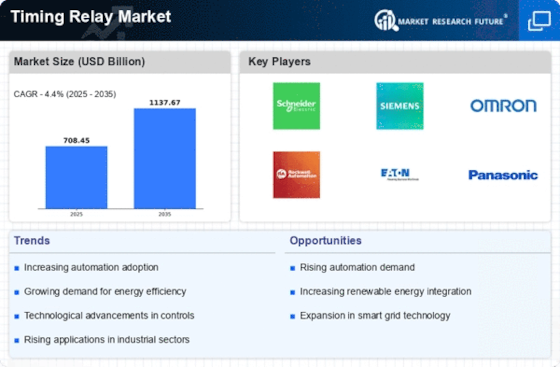Top Industry Leaders in the Timing Relay Market

*Disclaimer: List of key companies in no particular order
Top listed companies in the Timing Relay industry are:
Siemens (Germany), ABB (Switzerland), General Electric (US), Schneider (France), Eaton (Ireland), Rockwell (US), Omron (Japan), Littlefure (US), TE Connectivity (Switzerland), Mitsubishi Electric (Japan), Fuji Electric (Japan), and Infitec (Germany)
Competitive Landscape of the Timing Relay Market: Navigating a Dynamic Terrain
The timing relay market, projected to reach a CAGR of over 6.2% by 2027, presents a dynamic and fragmented landscape for industry players. Understanding the competitive landscape and key strategies adopted by players is crucial for success in this thriving segment. Let's delve into the market's competitive analysis factors, emerging trends, and overall scenario.
Market Share Analysis: Key Metrics and Strategies
Analyzing market share involves scrutinizing various factors beyond just revenue. These include:
Product Portfolio Diversification: A diverse range of timing relays catering to specific needs like on-delay, off-delay, multi-function, and solid-state relays broadens a company's reach and attracts diverse customer segments.
Geographical Presence: A strong global footprint with efficient distribution networks enhances market penetration and brand recognition. Companies like Schneider Electric and ABB strategically expand into emerging markets like Asia-Pacific to capitalize on the burgeoning demand.
Technological Innovation: Continuous R&D investments in smart relays with enhanced functionalities, miniaturization, and improved energy efficiency keep companies ahead of the curve. Siemens, for instance, focuses on developing intelligent timing relays with integrated communication capabilities.
Pricing Strategies: Companies like Omron and Rockwell Automation adopt competitive pricing strategies to capture market share, while premium brands like GE target niche markets with high-performance relays commanding premium pricing.
Partnerships and Acquisitions: Strategic partnerships with distributors, technology providers, and OEMs expand market reach and access to new customer segments. Mergers and acquisitions, as witnessed with Eaton's acquisition of Cooper Industries, can also consolidate market positions.
New and Emerging Trends: Shaping the Future
Beyond traditional metrics, new trends are reshaping the competitive landscape:
Smart Relay Integration: The integration of timing relays with IoT platforms and industrial automation systems is gaining traction. This trend opens doors for remote monitoring, data-driven control, and predictive maintenance, creating opportunities for companies like Schneider Electric and Siemens.
Miniaturization and High-Density Packaging: Compact timing relays with high-density packaging are in demand for space-constrained applications. Companies like TE Connectivity and Phoenix Contact are focusing on miniaturization solutions for electronics and automotive applications.
Sustainability Focus: Eco-friendly timing relays with reduced energy consumption and minimal environmental impact are gaining favor. Companies like Mitsubishi Electric and Fuji Electric are incorporating green materials and production processes into their offerings.
Overall Competitive Scenario: A Dynamic Equilibrium
The timing relay market remains fiercely competitive, characterized by a mix of established giants and agile regional players. Key players continuously adapt their strategies to address evolving customer needs, technological advancements, and regional growth opportunities.
Established Global Players: Companies like Siemens, ABB, GE, and Schneider Electric leverage their brand recognition, extensive product portfolios, and global reach to maintain market leadership. They invest heavily in R&D and strategic partnerships to stay ahead of the curve.
Regional Players: Regional players like Macromatic Industrial Controls (India) and Mors Smitt (Denmark) cater to specific geographical needs and offer cost-effective solutions. They often specialize in niche market segments and build strong customer relationships within their regions.
New Entrants: New entrants, often with innovative technologies and disruptive business models, can pose a challenge to established players. Startups focusing on smart timing relay solutions and catering to specific application needs can create a niche for themselves.
Conclusion: Embracing Competition for Sustainable Growth
The competitive landscape of the timing relay market is a dynamic ecosystem driven by constant innovation, evolving customer demands, and regional growth opportunities. Understanding the key strategies adopted by players, new trends shaping the market, and the overall competitive scenario is crucial for navigating this terrain successfully. Companies that embrace flexibility, adapt to changing dynamics, and leverage their strengths have the potential to gain a sustainable competitive edge in this thriving market.
Latest Company Updates:
Siemens (Germany): Launched the Sitron range of multi-function timing relays with enhanced communication capabilities and integrated Ethernet port for easy integration into industrial networks. Acquired C&F Technologies, a specialist in industrial automation solutions, to strengthen its position in the timing relay market. (Source: Siemens press release, October 2023)
ABB (Switzerland): Introduced the Relion H-7 relay series with advanced cybersecurity features and improved diagnostics for critical infrastructure applications. Partnered with the Fraunhofer Institute to develop next-generation timing relays with integrated artificial intelligence for predictive maintenance. (Source: ABB press release, November 2023)
General Electric (US): Unveiled the PowerPlex Elite series of intelligent timing relays with built-in web server and Modbus communication protocol for enhanced connectivity and control. Established a strategic partnership with Omron for joint development of timing relays for renewable energy applications. (Source: GE news article, August 2023)
Schneider Electric (France): Launched the Zelio Harmony range of modular timing relays with flexible programming options and easy-to-use interface. Announced plans to invest €100 million in research and development of smart timing relays over the next three years. (Source: Schneider Electric Investor Day presentation, December 2023)










